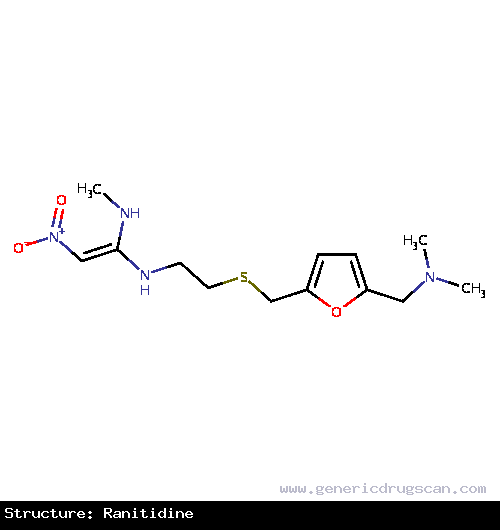Ranitidine Drug: Indication, Dosage, Precaution, Side Effect , Storage, Category Type and corresponding Brands - www.genericdrugscan.com
Ranitidine
Drug Status in USA : ApprovedDrug Status in Canada : Approved
pronunciation
pronounced as (ra ni' ti deen)
Why is this medication prescribed?
Ranitidine is used to treat ulcers; gastroesophageal reflux disease (GERD), a condition in which backward flow of acid from the stomach causes heartburn and injury of the food pipe (esophagus); and conditions where the stomach produces too much acid, such as Zollinger-Ellison syndrome. Over-the-counter ranitidine is used to prevent and treat symptoms of heartburn associated with acid indigestion and sour stomach. Ranitidine is in a class of medications called H2 blockers. It decreases the amount of acid made in the stomach.
How should this medicine be used?
Ranitidine comes as a tablet, an effervescent tablet, effervescent granules, and a syrup to take by mouth. It is usually taken once a day at bedtime or two to four times a day. Over-the-counter ranitidine comes as a tablet to take by mouth. It is usually taken once or twice a day. To prevent symptoms, it is taken 30 to 60 minutes before eating or drinking foods that cause heartburn. Follow the directions on your prescription or the package label carefully, and ask your doctor or pharmacist to explain any part you do not understand. Take ranitidine exactly as directed. Do not take more or less of it or take it more often than prescribed by your doctor.
Dissolve ranitidine effervescent tablets and granules in a full glass (6 to 8 ounces
- 180 to 240 milliliters
Do not take over-the-counter ranitidine for longer than 2 weeks unless your doctor tells you to. If symptoms of heartburn, acid indigestion, or sour stomach last longer than 2 weeks, stop taking ranitidine and call your doctor.
What are the precautions to be followed?
Before taking ranitidine,- tell your doctor and pharmacist if you are allergic to ranitidine or any other medications.
- tell your doctor and pharmacist what prescription and nonprescription medications, vitamins, nutritional supplements, and herbal products you are taking. Be sure to mention either of the following: anticoagulants ('blood thinners') such as warfarin (Coumadin); and triazolam (Halcion). Your doctor may need to change the doses of your medications or monitor you carefully for side effects.
- tell your doctor if you have or have ever had porphyria, phenylketonuria, or kidney or liver disease.
- tell your doctor if you are pregnant, plan to become pregnant, or are breast-feeding. If you become pregnant while taking ranitidine, call your doctor.
What are possible side effects of this medication ?
Ranitidine may cause side effects. Tell your doctor if any of these symptoms are severe or do not go away:- headache
- constipation
- diarrhea
- nausea
- vomiting
- stomach pain
Ranitidine may cause other side effects. Call your doctor if you have any unusual problems while taking this medication.
How to store the medication and dispose it of after its use later?
Keep this medication in the container it came in, tightly closed, and out of reach of children. Store it at room temperature and away from excess heat and moisture (not in the bathroom).
Unneeded medications should be disposed of in special ways to ensure that pets, children, and other people cannot consume them. However, you should not flush this medication down the toilet. Instead, the best way to dispose of your medication is through a medicine take-back program.
Drug Category/Class
- Anti-Ulcer Agents
- Drugs for Peptic Ulcer and Gastro-Oesophageal Reflux Disease (Gord)
- Drugs for Acid Related Disorders
- Combined Inhibitors of CYP3A4 and P-glycoprotein
- H2 Antagonists
- Alimentary Tract and Metabolism
- Cytochrome P-450 CYP1A2 Inhibitors
- Cytochrome P-450 CYP1A2 Inducers
- Cytochrome P-450 CYP2C19 Inducers
- CYP2D6 Inducers
- CYP2D6 Inducers (strong)
- CYP3A4 Inhibitors
| Prescribed | Used in the treatment of peptic ulcer disease (PUD), dyspepsia, stress ulcer prophylaxis, and gastroesophageal reflux disease (GERD). |
| Weight : | 314.404 |
| Structure | Ranitidine |
 | |
| Formula | C13H22N4O3S |
Ranitidine has 240 Brands listed
Search Generic Drugs alphabetically
